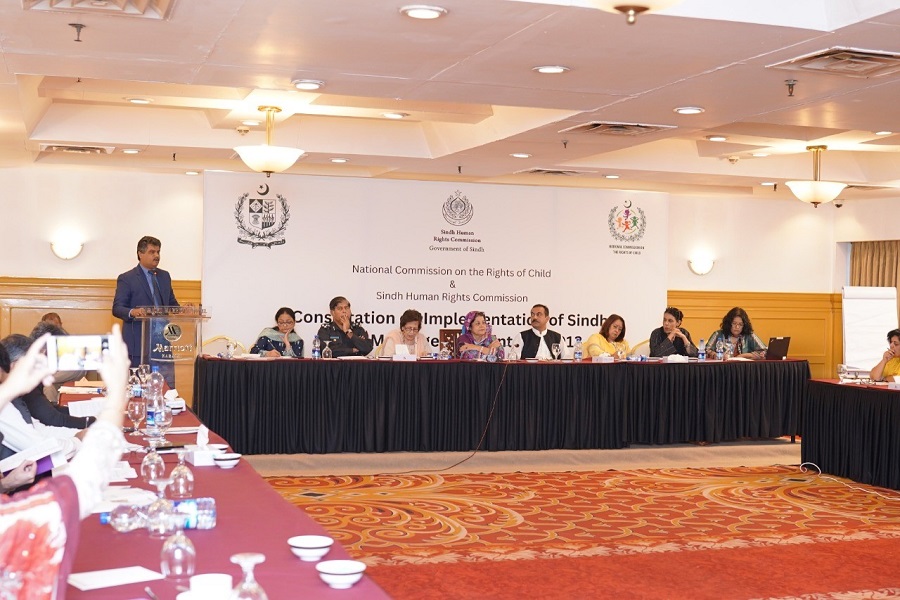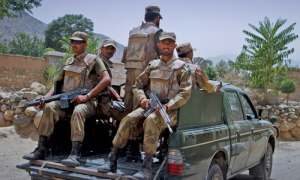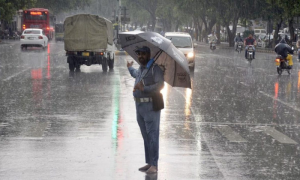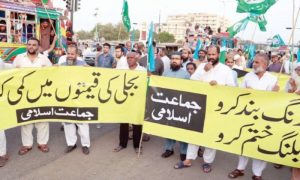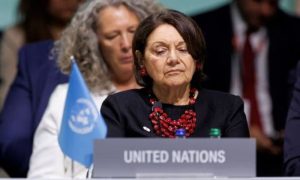KARACHI: Child marriages in Pakistan is a serious social problem and the state and society should take steps to stop this evil practice. Government should employ all resources for the purpose including the most important one, the implementation of Sindh Child Marriage Restraint Act-2013, speakers stressed in a seminar held in Karachi on Friday.
The Sindh Human Rights Commission (SHRC) in collaboration with National Commission on the Rights of the Child (NCRC) convened a consultation workshop titled “Implementation of Sindh Child Marriage Restraint Act-2013” at a local hotel. The purpose of the consultation was to identify the gaps in Sindh Child Marriage Restraint Act 2013 & Rules 2016, to discuss the challenges in implementation of law, infrastructural and institutional needs, possible collaborations, and suggested a way forward to address such gaps and impediments in the law and its implementation.
On the occasion, Justice (R) Majida Razvi, Chairperson, Sindh Human Rights Commission said that child marriages prevail in the whole country. In Sindh, role of police is cooperative and they are trying their level best to implement the act in befitted manner. Sindh is the only province who has the Child Marriage act and there is a need of the Uniformity of the age in whole of the country which should be 18 for girls and boys.
Mr. Jawadullah Khan, Member KP National Commission on the Rights of Child said that NCRC’s main function is examining existing laws. He remarked that NCRC reviewed 7 key child related laws (in 4 provinces and Islamabad). NCRC has looked at lacunae in these laws and NCRC is making its efforts to reform laws in the whole country.
Mr. Iqbal Ahmed Detho, Member Sindh National Commission on the Rights of Child gave an overview on Sindh Child Marriage Restraint Act, 2013 and Rules of Business, 2016. He pointed out that earlier SCMRA-1929 in definitions contained the word “Minor” that has been deleted in current law of SCMRA-2013. Though age has been unified for both male and female as adulthood but minor was providing shield against puberty argument and courts are not clearly applying the jurisdiction in matters of secular and personal laws. Word “Minor” was having correlation with contract which means that adult of 18 years can enter into marriage contract while child cannot become contracting party.
Mr. Detho pointed out that District Monitoring Committees have no budget and without budget they will be unable to conduct the meetings. He added that Child marriage is the issue of the whole nation.
Ms. Sarah Zaman, Child Rights Expert discussed the operational gaps and Challenges in the implementation of SCMRA 2013 and Rules 2016. She said that there are lacunas in the act but the legitimacy of the act is still there. Pakistan is in the trauma due to flood disaster and on other side, we do face several cases of trafficking, rape and child marriages. She remarked that poverty is not only the main reason of the Child marriage and there are other social political issue that needs to keep in mind while proposing the amendments. She suggested uniformity in age of child marriage the law across Pakistan.
Ms. Mahvish Maria, Child Protection Officer – UNICEF, remarked that Child Marriage is a human rights violation. Despite laws against it, this harmful practice remains widespread. Historically, women and girls are disproportionately affected during emergencies. Ms. Maria emphasized to sensitize communities for birth registration and marriage registration.
Ms Anis Haroon, Member, NCHR, said that child marriage is a violation of Human Rights and it is connected with several other rights of child such as child health, education etc. She added that Pakistan is already face some many issues such as malnutrition, over population and such issues are connected with child marriage.
On the occasion, Ms. Shirin Nareejo, Secretary Social Welfare Department highlighted social and economic factors in society that encourage child marriages. Ms Nareejo remarked that we do have different Acts and committees and now we are in the process of amending these laws which is a time-consuming process.
Ms. Mangla Sharma – (MPA MQM) shared that child marriages act is very useful for the religious minorities as in Sindh, forced conversation cases are frequent and this act supports in cases of child forced marriages and conversion.
In the chief guest speech, Shamim Mumtaz, PPP MPA Sind, said that frequent transfers of government officials and limited funds have adversely affected our work at child protection authority. She added that the Child Protection Unit exists in all districts of Sindh and we have managed several cases which were not highlighted in the media. Ms. Mumtaz appreciated the support of police and she also suggested making accountable to nikkah khawan and qazis who solemnize marriage of under age children.









